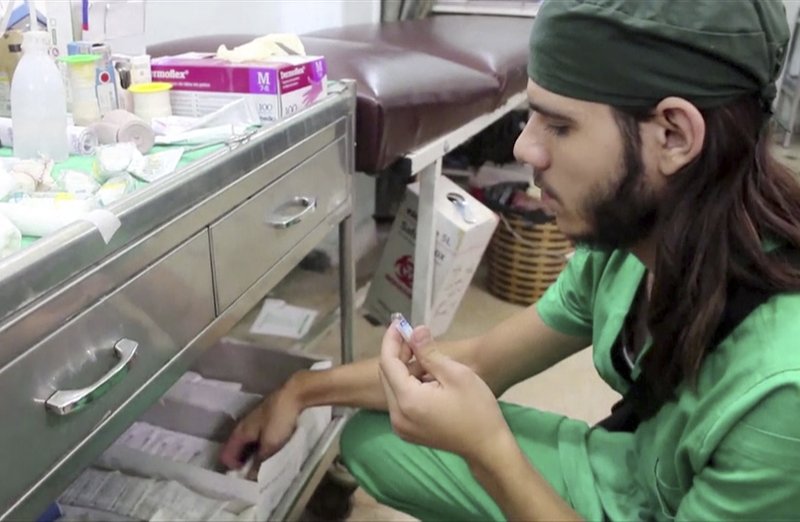BEIRUT -- Doctors Without Borders pleaded Monday for access to treat the wounded in the rebel-held part of Syria's Aleppo as government forces pressed ahead with an offensive that has killed hundreds of people in recent weeks.
The international charity said in a statement that medical workers in Aleppo are exhausted and that the overstretched facilities face an impending fuel shortage. The charity, which supports eight hospitals in Aleppo's besieged eastern quarters, said just 35 doctors remain in the area, serving a population of 275,000.
Eastern Aleppo's Health Directorate said the wounded were sleeping outside overcrowded hospitals, waiting for care. The U.N. has warned that the bombardment by Syrian and Russian warplanes could leave thousands more dead in Aleppo by the year's end.
"Russia and Syria must stop the indiscriminate bombing now and abide by the rules of war to avoid the extreme suffering of the unprotected civilian population," said Pablo Marco, the charity's operations manager for the Middle East.
The Britain-based Syrian Observatory for Human Rights, which monitors the conflict through local contacts, reported heavy fighting along the east-west Aleppo front lines. Another activist-run group, the Local Coordination Committees, said rebels were fighting to repel government forces from the city's largest water facility, which serves over a million people.
In another besieged area near the capital, Damascus, doctors reported up to two dozen cases of kidney failure that they said resulted from malnutrition. Muhammad Darwish, a physician in the area, said doctors confirmed renal failure in 12 people in the town of Madaya and were investigating another 12 cases.
Government forces have laid siege to Madaya, home to about 40,000 people, since late last year. Last winter, Doctors Without Borders reported at least 16 deaths there resulting from malnutrition and lack of medical care.
"We are only eating carbohydrates. We aren't receiving any vitamins or protein," Darwish said.
The government has prohibited the U.N. from delivering seeds or dialysis kits to the town, in what the opposition says is a strategy aimed at forcing the town to surrender.
The U.N. Security Council is deadlocked over how to respond to the Aleppo crisis, with Russia on Saturday vetoing a French-drafted resolution demanding an immediate halt to Russian and Syrian airstrikes and the rest of the council voting down a Russian resolution calling for the evacuation of opposition fighters.
Moscow has been a key backer of Syrian President Bashar Assad throughout the conflict.
Russia and Syria's government have both endorsed a proposal by U.N. envoy Staffan de Mistura to evacuate al-Qaida-linked militants from east Aleppo while skirting around the reciprocal part of the proposal, to abide by a cease-fire for the besieged area.
An official at Syria's Foreign Ministry said the government would ensure the safety of any civilians or militants who desire to leave, saying gunmen could take their personal weapons and relocate to other rebel areas. The official spoke on condition of anonymity in line with ministry regulations.
Russian President Vladimir Putin said during a visit to Turkey on Monday that Moscow and Ankara want to facilitate the delivery of aid to Aleppo, but that Syrian rebels would have to withdraw from a main supply route to ensure the safety of deliveries. He blamed the U.S. for failing to get them to do so, saying "the American side does not want to do that, or is not capable of doing that."
Moscow and Washington have repeatedly traded blame for the failure of a Syrian cease-fire last month.
U.N. Secretary-General Ban Ki-moon meanwhile urged the Security Council to refer the situation in Syria to the International Criminal Court for investigation of possible war crimes. He told reporters Monday that he was "deeply disappointed" at the lack of unity on Syria in the council, saying it must stop debating and disagreeing and "work to protect human lives, to bring this matter to a political solution."
Earlier, in an interview with the German broadcaster Deutsche Welle, Ban blamed Assad for the bloodshed, saying more than 300,000 people have been killed since the start of the war because of his "failure of leadership."
Jordan, meanwhile, said it is willing to allow regular aid drops by crane from its territory to tens of thousands of Syrians stranded on its sealed desert border, a government spokesman said Monday.
The comments by Mohammed Momani signaled an apparent shift in Jordan's position in talks with international aid agencies over access to the displaced.
However, two aid officials said nothing has been finalized. They spoke on condition of anonymity because talks are ongoing.
The pro-West kingdom sealed its border with Syria in June, after a deadly cross-border attack claimed by Islamic State extremists killed seven members the Jordanian security forces. That has left more than 75,000 Syrians stuck between a war zone and a sealed border, without regular access to food, water and medicine.
Information for this article was contributed by Philip Issa, Albert Aji, Cinar Kiper, Edith M. Lederer, Karen Janicek and Karin Laub of The Associated Press.
A Section on 10/11/2016

